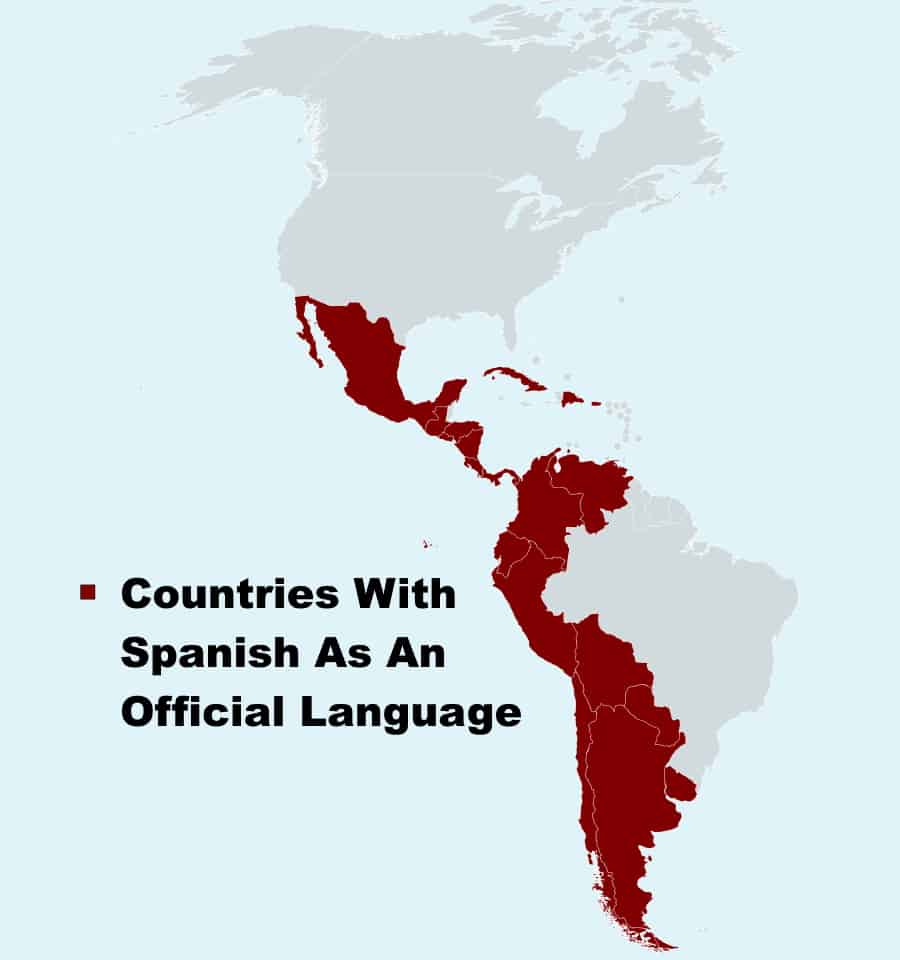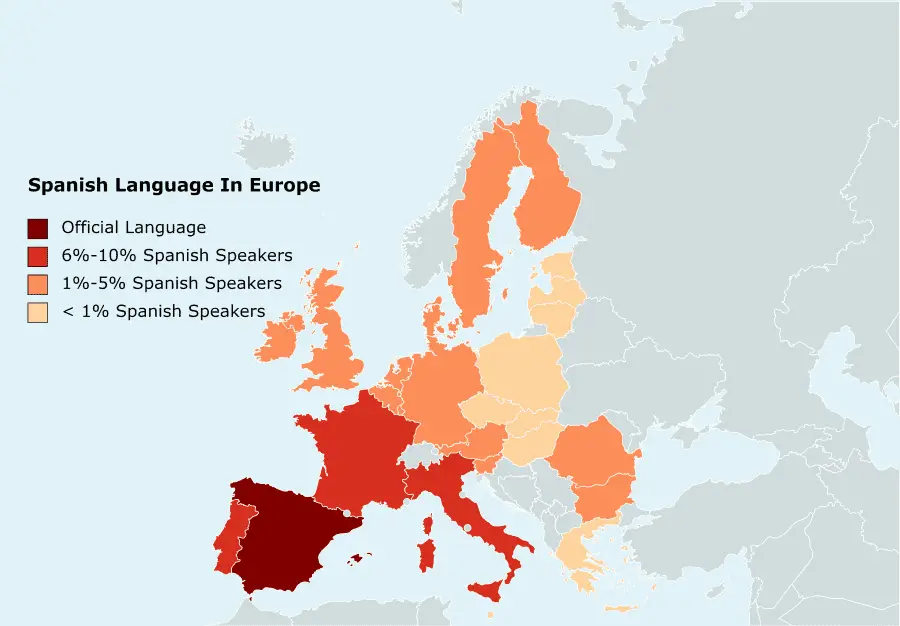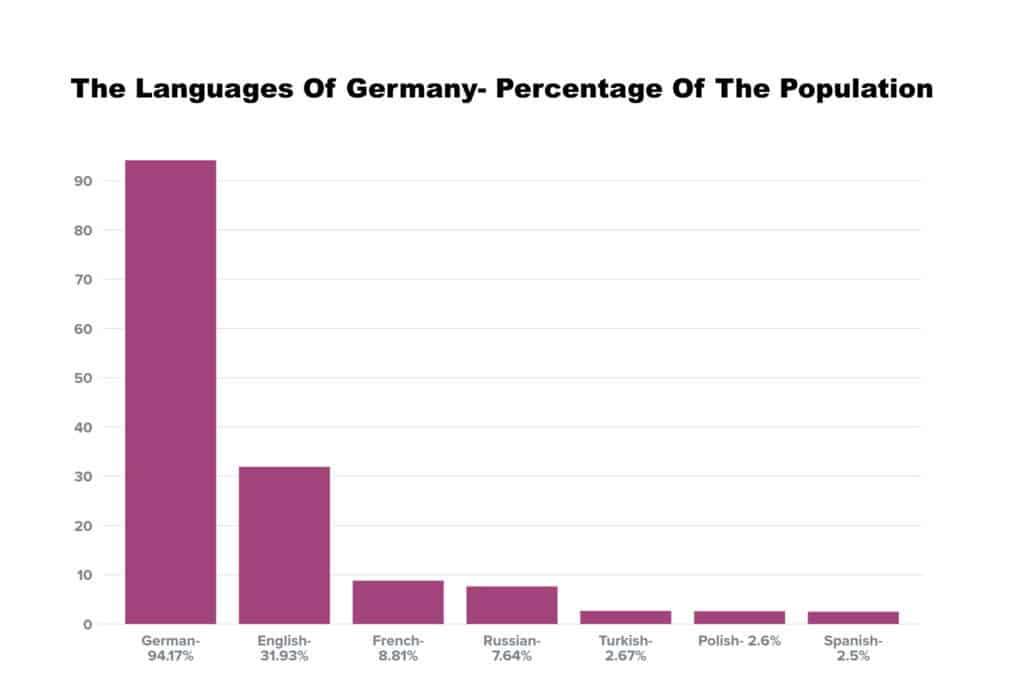With the high degree of post-secondary education in Germany and the advanced proficiency levels of English learned as a second language, many in around the world suspect that other languages would share the same experience. Is this the case? How common then is Spanish in Germany?
Spanish is not widely or commonly spoken in Germany. With a population of 83,240,525 souls and only 2.5% of them speaking Spanish on some level, Germany has only 2,081,013 people that speak it from beginner levels through fluency. English is preferred over Spanish as a second language.
These numbers come from sources here and here and are corroborated through research by many data collection agencies. Spanish only has a small presence in Germany, but the question is, why? That is what I am about to dive into below. I will examine Germany’s trends toward second languages, the role Spanish plays, and why it doesn’t have a bigger impact.

Contents
- 1 Spanish In Germany Compared To Other Countries
- 2 Will I Be Able To Get Around With Only Spanish In Germany?
- 3 How Many People Speak Spanish In Germany?
- 4 Where In Germany Is Spanish Commonly Spoken?
- 5 Languages Spoken In Germany
- 6 Do They Learn Spanish As A Second Language In Germany?
- 7 Why Don’t Germans Commonly Speak Spanish?
- 8 Final Talking Point: How Common Is Spanish In Germany?
Spanish In Germany Compared To Other Countries
The Spanish language is ranked number 4 in the world in total number of speakers with 543 million. Germany’s Spanish speakers only make up 0.383 percent of the world’s total population with skills in the language. Though Spain is only separated from Germany by France, their language has had minimal impact on the German society and culture.
Here we will look into the Spanish presence around the world and then in the neighboring countries of Germany. How does the Spanish levels in Germany compare with the rest of Europe and the world?
Spanish In Germany vs The World

One of the parts of the world with the most Spanish speakers is Central and South America in the Western Hemisphere. The map above shows the native Spanish speaking countries in this region with Spanish as an official language.
Of unique importance to us in our quest for understanding the low Spanish levels in Germany is the levels of Spanish in the United States. Germany being in close geographical proximity to Spain may cause some to estimate the Spanish language’s presence higher among its population.
The reality is that the United States has an exponentially higher immigration level both documented and undocumented from Mexico and other Latin and South American countries. Germany’s immigration from Spain is much lower in total numbers and extremely low percentage-wise when compared to their total immigration numbers.
The total number of Spanish foreign nationals for example in 2020 was just 1.6% of the total immigrant population. This is according to number collected by German government agencies which estimate the total number of immigrants to be 11.43 million. This accounts for 181,645 Spanish nationals in Germany.
| German Immigration | Numbers of Souls | Percentage of Total Immigration |
| Total | 11,432,460 | 100% |
| Immigrants from Spain | 181,645 | 1.6% |
Note: This percentage and number is smaller than above because here we are dealing not with second language learners, but foreign nationals immigrating to Germany with Spanish fluency.
Spanish is not one of the top languages for business, finance, or politics in the world. It is through immigration today and the settlers of generations past that brought the most spread of the Spanish language. Though the same can be said of English in part, today its spread is due more to cultural, economic, educational, and political influence.
A strong German culture, emphasis on their own language, and prosperous economy makes Germany resistant to easy assimilation of the Spanish language in their population.
Spanish In Germany vs Europe

As with many of the maps I have made to include on this site, the data on the map above shows that geographical proximity to a native speaking population of a language usually determines the level it will enjoy in the surrounding countries.
Spain being the largest native speaking country of Spanish in Europe, it radiates influence from the Iberian peninsula. The farther the country is situated from its borders the less Spanish will be found among its population.
Germany may not be terribly far from Spain geographically, but its culture is fairly strong. That combined with Spanish’s weaker standing in higher education and international trade than English and their native German language makes it a hard sell.
Even Spain’s direct neighbors have a Spanish speaking level of under 10% of their populations. This also includes those with relatively low levels of proficiency. Spanish is just not as popular as a second language in Europe as one might think.
It has a much stronger hold in the Western Hemisphere with the number one and two countries speaking it by population being Mexico and the United States.
Will I Be Able To Get Around With Only Spanish In Germany?
Many looking to travel to Germany for school, work, or vacation may wonder if their Spanish speaking skills will be of any use.
It is not possible to handle all or even most day to day tasks in Germany only using Spanish. The number of people speaking Spanish on any level is very small. This is even more true in less populated areas and locations with no university in close proximity.
I have taken many trips to Germany and my daughter has had both an exchange year in high school and a Fullbright scholarship to teach English for a year.
My husband Mat taught himself German and has been there many more times than I have. He also had a good friend that lived south of Munich he spoke German with for many years every Saturday.
From all of our personal experiences, Spanish is nearly non-existent in day to day conversations. You would have to make a very concerted effort to find any Germans that speak it. To find Spanish nationals may be slightly easier in some metro areas, but it would still be quite an effort.
Where you may have more success in finding Spanish is in high tourist areas, tour companies, or information centers in major population areas.
Spanish On German Street Signs
If you are trying to use Spanish in Germany, can you find it on street signs?
There is little to no Spanish on German street and caution signs. Most signs are done in pictograph style according to international trends. Text is limited in general on signs save street and location names. When there are directives in text they are in German and not Spanish.
This doesn’t mean that if you don’t understand German that street and road signs will be unrecognizable to you. Most of them follow easily understood patterns. With just a little effort before landing in Germany, you can memorize nearly all of the main symbols used.
Spanish On German Screens
Germany is one of those countries that has a thriving and well used dubbing and subtitling industry.
Spanish may be found on films native to Spain, but in the rare event they run on German ‘Kino‘ screens they are also shown in neighboring theaters dubbed into German. Nearly all movies and television shows are dubbed into the German language. With popular titles, the original language will also run.
When watching most television channels in Germany you will not find Spanish save for the random foreign new clip. Even then it will more than likely be talked over or dubbed.
There is the possibility of Spanish subtitles on some television and movie screens. You will have to check the local listings in the German city or town your are in to find out.
Spanish In The German Workplace
With German and English dominating the education system and business world in Germany, does Spanish have much of a presence in the German workplace?
Spanish has very little presence in the German workplace. The main areas you will find it in are tourism, international trade, and diplomacy. Engineering, manufacturing, and most others center on German with many being able to speak English. Spanish is rarely spoken or read in the German workplace.
With German the official and required language in most businesses and government offices, Spanish is not that useful in employment in Germany. There are language schools, but there usually are very limited spots available for Spanish teachers. Most students prefer English.
How Many People Speak Spanish In Germany?
So let’s get down to the core numbers so you can get a good idea of the Spanish language presence in Germany. What are the total numbers, percentages, and likelihood of finding Spanish speakers in Germany?
There are 83,240,525 people in Germany with a grand total of 2,081,013 people able to speak Spanish on some level. The native Spanish speakers that have arrived from mostly Spain are included in that number and in 2020 topped out at 181,645. Spanish has a low presence in Germany.
Though over 2 million people with Spanish language skills may sound like a large number out of context. When juxtaposed with the total population of Germany at over 83 million, it is clear that Spanish conversation in most areas of Germany will be hard to come by.
What Percentage Of Germany Speaks Spanish?
One way to get a better understanding of how prevalent or non-prevalent Spanish is in Germany is to look at it in terms of percentage and proportion. What percentage of Germany speak Spanish?
Spanish speakers of any proficiency level make up 2.5% of the total population. Native speakers of Spanish coming from countries like Spain make up a mere 0.383% of the over 83 million people in Germany. With over 11 million Spanish speakers, 1.6% of them are these foreign nationals.
When looking at the percentages, it becomes more clear as to how small the Spanish speaking population in Germany is. This miniscule presence means that for those looking to use Spanish in Deutschland, that very specific locations and situations will have to be found.
How Widely Spoken Is Spanish In Germany?
There is also another way to look at these numbers to get a more tangible feel for what it would be like to try to use Spanish to traverse through Germany. What are the chances of finding someone who speaks Spanish in Germany?
Someone looking to find a Spanish speaker in Germany would have to go through 50 random people before finding anyone with at least a basic speaking level. This is over a 1 in 50 chance. Meeting and talking to 50 Germans would be hard enough, but finding ‘good’ Spanish could be a monumental task.
From all of these numbers, percentages, and proportionality one thing can be clearly seen. Spanish is hard to find in Germany and would not be a viable language to use for an extended period of time.
Where In Germany Is Spanish Commonly Spoken?
To find places where a Spanish speaker is more likely to find his or her language, it will take larger populations and university campuses where Spanish is taught. Native populations of foreign language speakers in any country tend to congregate near population centers.
Here we will look at some of the major cities in Germany where the chances are higher that Spanish speakers will be found.
Major Cities In Germany Where Spanish Is More Likely To Be Found
Spanish In Hamburg
Population 1,739,117 – With the largest harbors in Europe, Hamburg hosts the tourism and trade industries on a large scale. Shipping brings in the majority of the trade and its immense green space system of parks draws the tourists. These raise the chance slightly to find Spanish speakers.
The 43,957 students attending the University of Hamburg also offer a bit more of a chance to hear Spanish spoken. University campuses are normally a good bet when looking for a foreign language in any country.
Spanish In Munich (München)
Population 1,260,391 – If you look on any ‘Best Cities In The World’ lists, Munich will most likely be in one of the top spots. We have visited several times and wholeheartedly agree. The higher income and education levels in the city cause it to be a decidedly expensive, but very beautiful and livable.
The presence of the 51,000 students of Ludwig Maximilian University of Munich could offer a better opportunity to find Spanish. Most German college campuses will have some level of Spanish, even if it is relatively small.
Spanish In Cologne (Köln)
Population 963,395 – Köln is the center for some of Germany’s most popular German language television stations. There are other tourist draws as well like the Kölner Dom, the 9th largest cathedral in the world. Some Spanish could be found in some major tourist spots.
The University of Cologne lays claim to 51,250 students. As with most universities of this size, Spanish has a slight possibility to be found spoken among its population.
Spanish In Frankfurt Am Main
Population 650,000 – With many Germans nicknaming Frankfurt as the ‘German Manhattan’, English is also an easy find in the city. Spanish however will be a much more difficult proposition to locate. Among its mirrored skyscrapers there may be a small contingent, but in general Spanish is not widely spoken.
Goethe University Frankfurt with its 45,533 students may offer some opportunities to speak Spanish on some level. Though you are more likely to find students conversationally fluent in English than Spanish. These students have learned English throughout their public educations.
Languages Spoken In Germany
Germany is not a monolingual country by any means. Its lack of significant Spanish language presence is more out of a national consensus rather than aversion to second or third languages. Germany has several second languages that many in its population speak.
The list of the top languages of Germany by percentage of population:
- German – 94.17%
- English – 31.93%
- French – 8.81%
- Russian – 7.64%
- Turkish – 2.67%
- Polish – 2.6%
- Spanish – 2.5%
According to comprehensive current surveys, Germany has 7 major languages in the list of the most spoken languages in the country. Five are of European origin and 2 are from the Asian continent.

With the native language naturally being German, the second language of choice for most Germans is English. This is not by a slight margin, but by exponential factors. Spanish has a very low standing when it comes to second languages spoken or learned.
Spanish actually is in the 7th spot on the list of most spoken languages in Germany. This is inclusive of many Germans learning the language. The actual native Spanish speaking population is much smaller than this total.
Do They Learn Spanish As A Second Language In Germany?
Are there plans to raise the levels of Spanish speaking in Germany? Is it offered in public school or only in private settings? What about universities?
Spanish In Germany’s Public Schools
One of the best ways to develop language learners is to promote it in schools. Is Spanish a class offered to the majority of the student populations in public education throughout Germany?
There are Spanish language classes in some public schools and some private tutors exist in language schools. The number of Spanish teachers is relatively low though, and not all public schools offer it as a course. Those wanting to learn Spanish usually have to seek out private instruction.
The problem is the demand. Germans by in large don’t seek out Spanish language classes.
This makes it hard for those teaching Spanish to find language positions even in these private language class settings. Most Germans look to learn English.
Spanish In German Universities
What about the state university system? Are there courses that college aged students can take in Spanish?
Spanish is usually offered as a course in most all universities depending on student enrollment. These classes have a low demand in most locations due to the lack of emphasis placed on Spanish as a language helping students reach their career goals. Spanish is seen more as a desire than a need.
Those wishing to study Spanish in a German university must realize that a strong emphasis is placed on the German language. The exceptions are for English, with many classes given in English as an alternative.
No such Spanish equivalent is offered, and normally only Spanish language instruction can be found. There are no classes given on different subjects in Spanish in Germany.
Why Don’t Germans Commonly Speak Spanish?
What reasons lie behind the low Spanish language skills in Germany? Is this a concerted effort by the Germans to downplay the Spanish language, or is it a matter of practicality?
The low Spanish language level in Germany have to due with practical applicability and the prevalence of English in most forms of media. The business, political, and entertainment worlds are currently dominated by English. Little room is left for Spanish in the future plans of young people.
Germans tend to be pragmatic in their choices for the most part. Spanish language learning is seen by some as an interesting hobby, but even for travel it is not considered necessary.
Take the island of Mallorca for instance. This island off the coast of Spain is a hot holiday destination for many Germans. Yet, on this island, German is on signs, spoken in the streets, and is relatively common to find. Germans simply don’t see Spanish as a need even when on vacation.
Final Talking Point: How Common Is Spanish In Germany?
So, is Spanish commonly spoken in Germany? The short answer is, no. Germans that do learn the language are usually doing it to low levels and on a hobby style basis.
The immigrants from Spain are very low in comparison to the numbers of yearly immigrants and the total population in general. Their presence doesn’t do a lot to lift the amount of Spanish spoken on German soil.
English has taken the country by storm. When we were there many times, most Germans we met had better English skills that my husband’s German level even after he had spent years learning the language. Spanish is no where near this level.
There are many places around the world that Spanish is held in high regard. It is a beautiful and useful language, but for the average German, others languages catch their attention.
